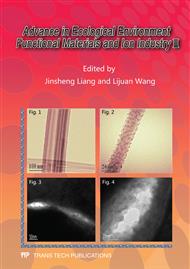p.7
p.13
p.19
p.26
p.32
p.38
p.45
p.51
p.55
Effect of Chitosan as Antimicrobial Agent on Flame Retardant Protein Viscose Fiber
Abstract:
The effects of chitosan as the antimicrobial on Protein viscose fibers were studied in this research. Antimicrobial flame-retardant protein viscose fibers are more efficient compared with original flame-retardant protein viscose fiber in improving the limiting oxygen index (LOI) of fiber. The effectiveness of the microstructure was investigated using scanning electron microscope (SEM).SEM images showed that the antimicrobial finishing and the softener were made in a same bath, which might be due to the formation of a protective layer or cross linking effect.
Info:
Periodical:
Pages:
32-37
DOI:
Citation:
Online since:
January 2012
Authors:
Price:
Сopyright:
© 2012 Trans Tech Publications Ltd. All Rights Reserved
Share:
Citation:


